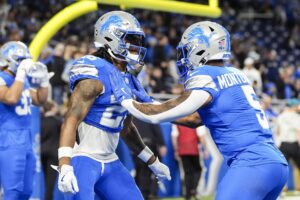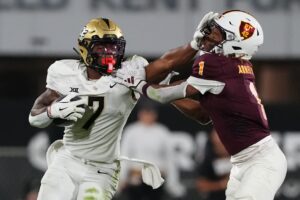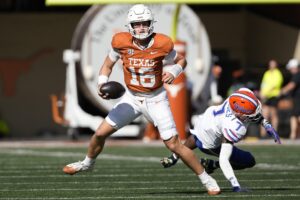Prepare yourselves for starting running back changes, football fans. Every year there is shake-up on some level to every roster. However, this year figures to be different. The production of certain running backs has made them potential cut candidates. There are contracts that allow the teams to be more flexible. And the upcoming draft class (which is excellent) is providing prospective teams with cheaper, potentially better options. A running back upheaval is upon us, my friends. Perhaps as much as half of the league could be looking at a new starting running back next year. Here is how this upheaval may affect the AFC West.
(All contract information is from Over The Cap. All statistical data is from PlayerProfiler).
Running Back Changes – AFC West Edition
Oakland Raiders
Out of all of the teams in the AFC West, the Raiders have the greatest probability of shaking things up in their backfield. Last season Marshawn Lynch led the team in carries (207), rushing yards (891), and touchdowns (7). While those numbers are hardly a huge disappointment, they do raise more questions for the Raiders. Specifically, is that kind of production worth $6 million? Lynch, who will be 32 next season, carries such a price tag, which is top 10 at the position. However, if the Raiders cut Lynch before June 1st, they would save that entire sum. It’s hard to see the team not moving on from him before the start of next season.
If the team does move on from Lynch, who would the team turn to? With a projected cap room of nearly $19 million, the Raiders could theoretically look towards free agency to fill the space. That said, the projected crop of free agent running backs is far from inspiring, so it would make more sense to turn toward their roster or the draft to find next year’s starter.
As far as their roster goes, the two best options are DeAndre Washington and Jalen Richard. Both players nearly saw the same amount of carries but Richard bested Washington in yards (275 to 153) and consequently yards per carry (4.9 to 2.7). The numbers seem to point in Richard’s favor until you dig a little deeper. Washington nearly had the same amount of yards created, which suggests that the blocking for Washington wasn’t as good. And when you take into account that Washington has the better athletic profile and doesn’t have the same fumbling problems as Richard, the arrow points back in Washington’s favor. In truth, if the Raiders don’t address the position early in the draft, we will likely be looking at a (pause for dramatic effect) running back by committee in Oakland.
Kansas City Chiefs
Not a lot to see here. Kareem Hunt is the starter, who the offense will forget they have for a few weeks next season. If the Chiefs are going to make any moves at the position, they will likely be for depth. Spencer Ware and Charcandrick West are both under contract with identical cap numbers ($2,083,334). If either are cut before June 1st, they would provide the same amount of cap savings ($1,750,000). While that could happen, both Ware and West provide good value while Hunt’s cap number remains low.
Los Angeles Chargers
The “Los Angeles Chargers” is still weird to write. Similar to the Chiefs, there isn’t a lot to see here either. Melvin Gordon is the starter. Austin Ekeler impressed in his rookie season, which pretty much solidifies the backup role. The only thing the Chargers need to do is round out their depth with Branden Oliver now a free agent.
Denver Broncos
In the world of running back upheaval, count the Broncos as a possible player. C.J. Anderson finished the year on a strong note, leading the team in carries (245), rushing yards (1,007), and rushing touchdowns (3). The majority of those numbers indicate that Anderson could find his way back to the starting role next year.
It gets interesting when you look at Anderson’s contract. Next year Anderson’s cap number is $4.5 million (14th for his position). If the Broncos cut Anderson before June 1st, none of that money would count against the cap. In short, the Broncos have 4.5 million reasons to move on. However, Anderson’s career so far exists only to support the peak-end rule, so the Broncos may struggle to move on.
If they decide to part ways, the Broncos will have a number of options. They could turn to Devontae Booker, who profiles as the superior athlete with a better college track record. The team could make it a point to get De’Angelo Henderson more involved. They could turn to free agency. Or they could take their pick of what is going to be a very, very deep running back class in the upcoming draft. How the Broncos choose to address their quarterback problem this offseason will certainly affect how they deal with their running backs.
Last Word
Out of the entire AFC West, only two teams could possibly change who is their starting running back: the Raiders (more likely) and the Broncos (less likely).






